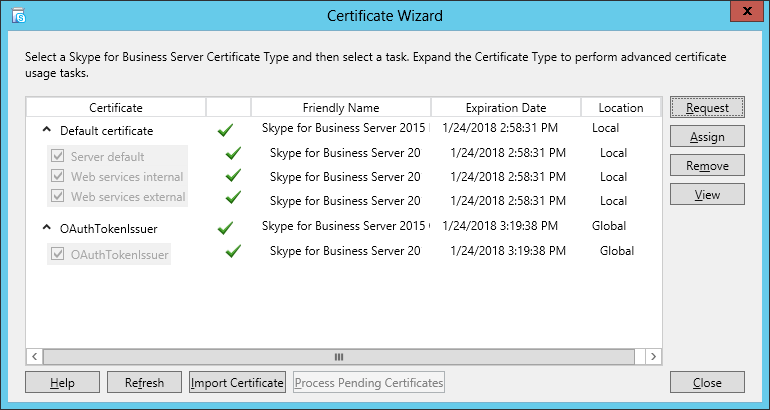
- #SELF SIGNED CERTIFICATE FOR SKYPE SERVER 2015 GENERATOR#
- #SELF SIGNED CERTIFICATE FOR SKYPE SERVER 2015 WINDOWS#
The Subject Alternative Name (altNames attribute) entries must include the Trusted Application Pool FQDN (i.e.The Subject name (commonName attribute) must be the Trusted Application Pool FQDN (such as confpool-eu.vc. in our examples).When requesting certificates for Conferencing Nodes for on-prem deployments: See Assigning publicly-issued TLS server certificates to Conferencing Nodes for more information and examples for a public DMZ deployment. Assign the same certificate to all of the public DMZ nodes that are involved in call signaling.vc. from the example _sipfederationtls SRV record above). the domain names that are used in any DNS SRV records that route calls to those Conferencing Nodes (e.g.the FQDNs of all of the public DMZ nodes that are involved in call signaling.the target hostname referenced in the Subject name.The Subject Alternative Name (altNames attribute) entries must include: In our examples, if the DNS SRV record is: The Subject name (commonName attribute) should be set to the target hostname referenced by the _sipfederationtls._tcp SRV record (the pool name of the Conferencing Nodes). When requesting certificates for Conferencing Nodes for public DMZ deployments: Alternatively, you can use third-party tools such as OpenSSL toolkit.
#SELF SIGNED CERTIFICATE FOR SKYPE SERVER 2015 GENERATOR#
You can use Pexip Infinity's inbuilt Certificate Signing Request (CSR) generator to assist in acquiring a server certificate from a Certificate Authority. If you are using SIP or Skype for Business / Lync, your Conferencing Nodes must not use wildcard TLS certificates. Wildcard TLS certificates are not supported in SIP or Microsoft Skype for Business / Lync environments (as per RFC 5922). While this means that this single certificate will potentially contain a relatively high number of names, the administrator only has to manage a single SAN certificate across all Conferencing Node (unless multiple domain/subdomain support is required). This type of certificate is also known as a UC certificate. Therefore, the certificate created for the Conferencing Nodes will typically need to contain multiple SANs (Subject Alternative Names). This provides support for redundant Conferencing Node deployments and multiple SIP domains for SfB/Lync federation.

The on-prem and public DMZ SfB/Lync integration guidelines both recommend that the same single certificate is installed on all Conferencing Nodes. Creating a certificate signing request (CSR) * Note that where this documentation refers to " SfB/Lync", it represents both Microsoft Skype for Business and Lync unless stated otherwise. General information on managing certificates within Pexip Infinity can be found at Managing TLS and trusted CA certificates.

#SELF SIGNED CERTIFICATE FOR SKYPE SERVER 2015 WINDOWS#
Configuring Windows Server Manager to use a certificate template with client and server capabilities.Configuring the SIP TLS FQDN for a Conferencing Node.



 0 kommentar(er)
0 kommentar(er)
